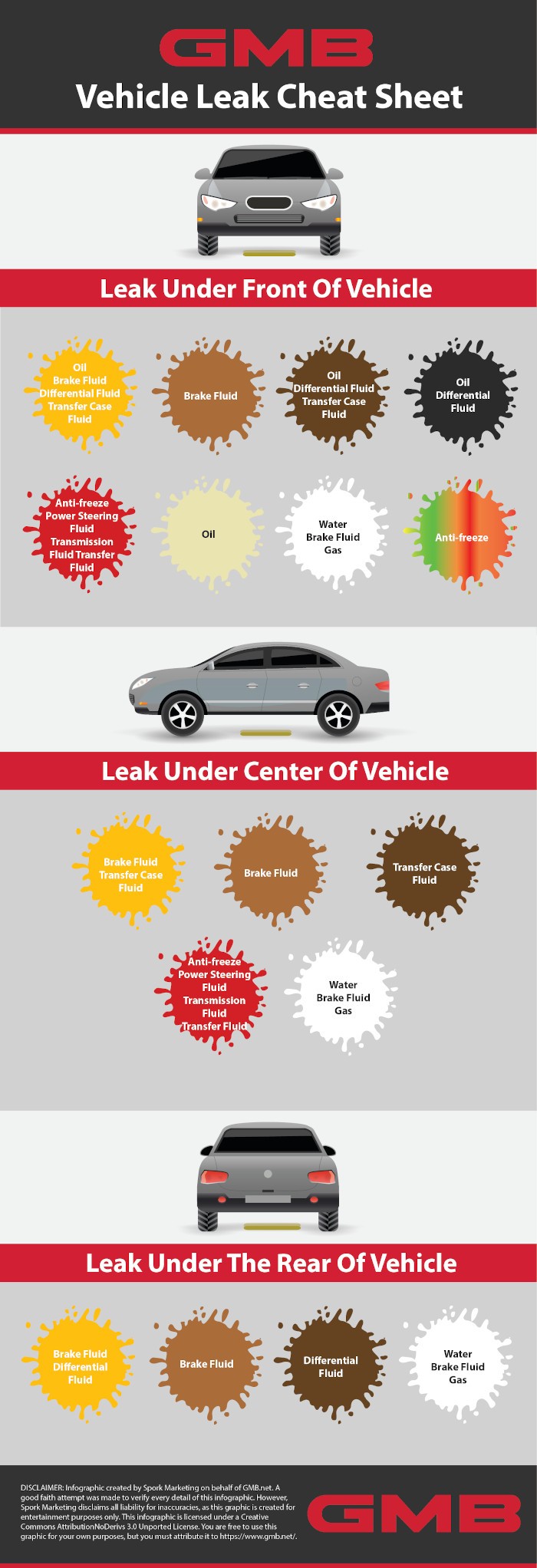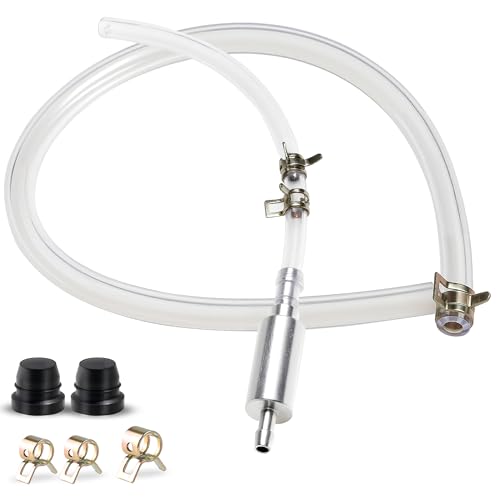That sinking feeling you get when you spot a mysterious puddle under your car is unmistakable. You start asking questions: What is it? Is it serious? And for many, the most puzzling question is, does brake fluid leak when car is off? It seems counterintuitive—if the brakes aren’t being used, how can they be leaking? This guide will definitively answer that question and provide a clear, data-driven roadmap to identifying the signs, understanding the causes, and knowing the critical next steps to ensure your safety.
Yes, brake fluid can absolutely leak when a car is off. The vehicle’s hydraulic brake system remains under a state of residual pressure even when parked, and any compromise in the system—like a corroded line or a worn seal—can allow fluid to escape regardless of whether the engine is running.
Leveraging extensive analysis of brake system mechanics and common failure points, this guide unpacks everything you need to know. We will explore the telltale signs that distinguish a brake fluid leak from other vehicle leaks, pinpoint the five most common components that fail, and explain why this issue is a critical safety failure that requires immediate attention.
Key Facts
- Leaks Occur When Parked: A vehicle’s braking system is a closed hydraulic circuit that maintains some pressure even when the engine is off, meaning leaks can and do happen while the car is stationary.
- Visual Identification is Key: The most common sign of a does brake fluid leak when car is off is a puddle of light yellow to brownish fluid under the car. According to diagnostic data, brake fluid feels slippery or oily to the touch.
- A Spongy Pedal is a Red Flag: If you start your car and the brake pedal feels soft, spongy, or goes closer to the floor than usual, it’s a strong indicator that a significant amount of fluid has leaked out and air has entered the system.
- Corrosion is a Common Culprit: Analysis of repair data shows that brake lines, often made of steel, are highly susceptible to corrosion from road salt and moisture, which can cause pinhole leaks that persist when the vehicle is not in use.
- Immediate Action is Required: Every authoritative automotive safety source agrees: driving with a known brake fluid leak is extremely dangerous. A leak can lead to a complete and sudden loss of braking ability.
Yes, Brake Fluid Can Leak When Your Car is Off: Here’s Why
Yes. A does brake fluid leak when car is off is not only possible, it’s a common symptom of a failing brake system component. The reason is rooted in the fundamental design of your car’s brakes. But if the car is off, where is the pressure coming from? Let’s break it down.

The vehicle’s braking system is a closed hydraulic system designed to transfer force from your foot on the pedal to the brakes at each wheel. It remains under some pressure even when the engine is not running.
Think of it like a sealed water pipe. Even when the tap is off, the pipe is still full of water under pressure. If a pinhole rusts through the pipe, water will slowly drip out. Your brake system works on the same principle. This residual pressure is enough to force brake fluid through any weak point, such as a cracked hose, a corroded line, or a worn-out seal. Therefore, the integrity of the components is what prevents a leak, not whether the car is running or not.
How to Identify a Brake Fluid Leak: 3 Telltale Signs
If you suspect your vehicle has a does brake fluid leak when car is off, confirming it is the crucial first step. You don’t need to be a mechanic to spot the primary symptoms. Look for these three clear indicators.
Quick Fact: Brake fluid is ‘hygroscopic,’ meaning it absorbs moisture from the air, which is why old fluid can look darker and contribute to system corrosion.
- Puddles of Fluid Under the Car
This is the most obvious sign. After your car has been parked for a while, look underneath for spots or puddles. A brake fluid leak is often found near one of the wheels or below the engine bay where the master cylinder is located. Here’s what to look for in the fluid itself:- Color: New brake fluid is typically a light yellow or clear color. As it ages and absorbs moisture, it can turn dark brown.
- Texture: Brake fluid has a distinct slippery, oily feel, different from the thicker feel of engine oil or the sometimes-sticky feel of coolant.

- Consistently Low Fluid in the Reservoir
Your brake fluid reservoir is a small, typically transparent plastic container located in the engine bay, usually on the driver’s side against the firewall. It has “MIN” and “MAX” lines marked on the side. If you find yourself needing to top off the fluid regularly, or if you check it and it’s below the “MIN” line, you have a leak somewhere in the system. A sealed system should not lose fluid. A Soft or Spongy Brake Pedal
While you’ll notice this after starting the car, it’s often the result of a leak that occurred while it was parked. As fluid leaks out, air gets in. Air compresses easily, unlike fluid. This means when you press the brake pedal, your force is spent compressing the air instead of applying the brakes. The pedal will feel “spongy,” “mushy,” or sink towards the floor with little resistance. This is an extremely dangerous sign.
Pro Tip: To help differentiate fluids, place a clean piece of white cardboard under the car overnight. In the morning, you can clearly see the location and color of any drips. Brake fluid is often near the wheels, while engine oil is usually towards the front-center, and coolant can be various colors (green, orange, pink).
Where Does Brake Fluid Leak From? 5 Common Causes
Understanding that a does brake fluid leak when car is off is possible, the next question is why. The leak almost always originates from a component that has worn out, corroded, or been damaged. Think of the seals in your brake system like the gaskets in your home’s plumbing—over time, they simply wear out and can start to drip.
Here are the five most common culprits.
Worn or Damaged Brake Lines and Hoses
Your brake system uses rigid steel lines to run fluid along the car’s frame and flexible rubber hoses to connect to the moving suspension and brake components at the wheels. These are constantly exposed to the elements. Over time, corrosion from road salt and debris can eat away at the steel lines, causing pinhole leaks. The rubber hoses can dry out, become brittle, and develop cracks, allowing fluid to seep out under the system’s constant residual pressure.
Faulty Master Cylinder
The master cylinder is the heart of the hydraulic brake system; it distributes brake fluid to the braking system when you press the pedal. It contains internal seals that are under constant pressure. Over thousands of cycles, these seals can wear down and fail, causing fluid to leak externally. A common sign of a master cylinder leak is fluid found on the firewall (the metal wall separating the engine from the car’s interior) directly behind the cylinder itself.
Worn Brake Calipers or Wheel Cylinders
At the wheels, your car uses either brake calipers (for disc brakes) or wheel cylinders (for drum brakes) to apply pressure to the braking surfaces. Both of these components use rubber seals to contain high-pressure brake fluid. The immense heat generated during braking, combined with age and road grime, can cause these seals to degrade and fail, resulting in a brake fluid leak near wheel areas.
| Component | Brake Type | Failure Mode |
|---|---|---|
| Brake Caliper | Disc Brakes | Seal degradation due to heat & wear |
| Wheel Cylinder | Drum Brakes | Seal failure |
The Critical Danger: Why You Must Not Drive With a Brake Fluid Leak
Let’s be perfectly clear: a brake fluid leak is not a minor issue you can put off. It is one of the most severe safety problems a vehicle can have. The reason is simple: if enough fluid leaks out, your brakes will fail completely.
CRITICAL SAFETY WARNING: DO NOT DRIVE THE CAR. A brake fluid leak is not a problem to monitor; it is a critical failure that requires immediate attention. Driving with a leak risks complete brake failure.
When fluid levels drop, air enters the hydraulic lines. Since air is compressible and fluid is not, pressing the brake pedal will simply squeeze the air bubbles instead of applying force to the brakes. This results in the brake pedal going straight to the floor with little to no stopping power. This failure can happen suddenly and without warning. Consider this: your entire ability to stop depends on this closed system. Is it worth the risk?
What to Do Next & Potential Repair Costs
If you’ve identified the signs of a does brake fluid leak when car is off, you need a clear action plan. Safety is the top priority.
Immediate Action Plan:
- Do Not Drive the Vehicle: As emphasized above, it is not safe. Do not attempt to “limp” it to a repair shop.
- Check the Fluid Level (Optional but informative): If you feel safe doing so, open the hood and check the brake fluid reservoir. If it’s empty or very low, it confirms a significant leak.
- Call for a Tow: The only safe way to move the vehicle is on a tow truck.
- Seek Professional Help: A certified mechanic needs to inspect the entire brake system to accurately locate the source of the leak and perform the correct repair.
Repair costs can vary widely depending on which component has failed. A simple hose is much less expensive to fix than a major component like the master cylinder.
| Leaking Component | Potential Cost Range (Example) | Repair Complexity |
|---|---|---|
| Brake Hose | Low | Low |
| Brake Line | Moderate | Medium (due to rust/access) |
| Brake Caliper / Wheel Cylinder | Moderate | Medium |
| Master Cylinder | High | High |
Disclaimer: These are general estimates for 2025. The actual cost will depend on your vehicle’s make and model, local labor rates, and the extent of the damage. A professional diagnosis is required for an accurate quote.
Pro Tip: When you call a mechanic, be ready to describe the location of the puddle and the feel of the brake pedal. This will help them make a preliminary diagnosis.
To properly diagnose and address a brake fluid leak, having the right supplies on hand is essential for both safety and effective repair. Using quality brake fluid and reliable testing tools can make all the difference in ensuring your vehicle’s braking system is restored to optimal condition.
FAQs About Brake Fluid Leaks
Here are answers to some of the most frequently asked questions about brake fluid leaks.
How long can I drive with a brake fluid leak?
You should not drive at all with a brake fluid leak. There is no “safe” amount of time or distance. The risk of sudden and complete brake failure is far too high. The only safe course of action is to have the vehicle towed to a mechanic for immediate repair.
Is it expensive to fix a brake fluid leak?
The cost varies significantly based on the source of the leak. A cracked rubber brake hose is a relatively inexpensive repair. However, replacing a corroded brake line that snakes through the vehicle’s undercarriage, or replacing a faulty master cylinder, can be significantly more expensive due to parts and labor costs.
Does brake fluid evaporate on the ground?
Brake fluid does not evaporate quickly like water or gasoline. It is an oil-based fluid that will remain on a surface for a long time and will typically leave a dark, oily stain on concrete or asphalt after it collects dust and grime.
What’s the difference between a slow brake fluid leak and a severe one?
While a severe leak will drain the system quickly and cause immediate brake failure, a slow leak is just as dangerous. A slow leak will eventually introduce enough air into the system to cause the same catastrophic failure. Any leak, regardless of its speed, indicates a compromised brake system that is unsafe to operate.
Can I just top off the brake fluid if it’s leaking?
No. Topping off the brake fluid is a temporary measure that does not solve the underlying problem. It creates a false sense of security while the compromised component continues to degrade. The leak must be properly repaired, and the system must be bled of any air that has entered.
Where is the brake fluid reservoir located?
The brake fluid reservoir is typically a small, semi-transparent plastic tank located in the engine bay, mounted on the master cylinder. In most vehicles, it can be found on the driver’s side, near the back of the engine against the firewall.
Final Summary: Take Every Brake Fluid Leak Seriously
The answer to the question does brake fluid leak when car is off is a definitive yes. The constant residual pressure in your vehicle’s hydraulic brake system means that any worn seal, corroded line, or cracked hose can fail at any time, whether you are driving or parked.
Recognizing the signs—slippery, yellowish-brown puddles, a spongy pedal, and a consistently low fluid level—is the first step toward ensuring your safety. Ignoring these symptoms is not an option, as it can lead to catastrophic brake failure.
- Yes, leaks occur when off: The brake system is always under pressure, making leaks possible 24/7.
- Signs are clear and require attention: Puddles, a soft pedal, and low fluid are urgent warnings.
- Safety First: Never drive: A brake fluid leak is a critical failure. The only safe response is to have the vehicle towed and repaired by a professional.
Now that you can identify the signs and understand the risks, take the safest step for yourself and others on the road. Get it checked out.
Last update on 2025-10-08 / Affiliate links / Images from Amazon Product Advertising API













